On Monday evening, news broke that award-winning actor Robin Williams had died.
Details emerged that the late actor battled with severe depression for quite some time, and that prompted an internal dialogue about depression and suicide among BuzzFeed staffers.
To highlight the complexities and pervasiveness of depression and suicide, a few BuzzFeed staffers decided it would be helpful to candidly express how they've combated depression and suicide.
This was done in the hope that their testimony will help someone struggling with a similar issue.
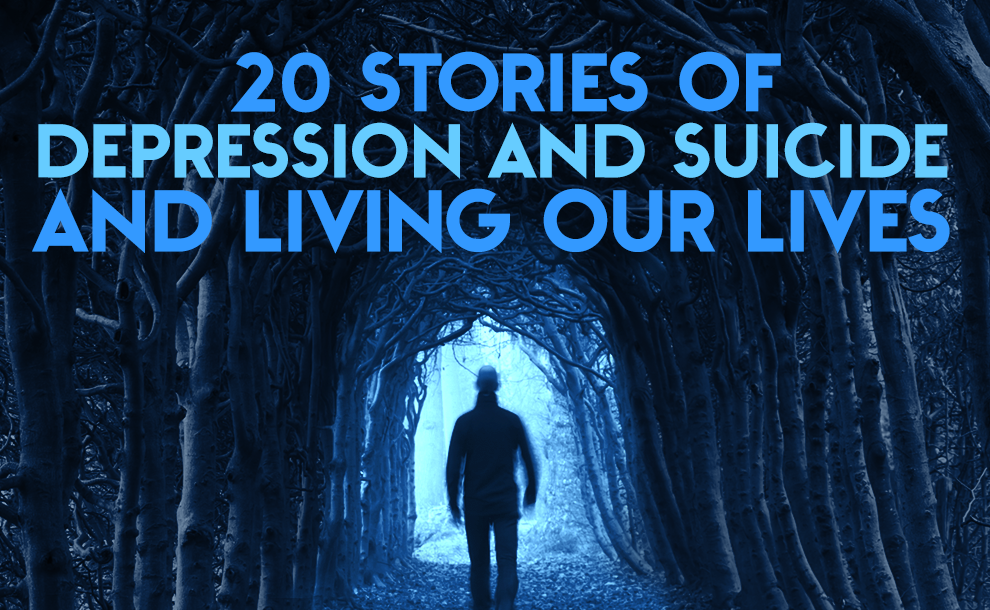
I've been dealing with major depression my entire adult life. In high school I fought my parents to let me see a therapist, and when I finally saw one before my senior year of high school, I was diagnosed with major depression, OCD, and social anxiety disorder. Senior year was tough — I made excuses to friends as to why I was busy every Tuesday afternoon because I was embarrassed to say I was in therapy. I confided in a few close friends who were supportive, but frankly I was relieved to leave my hometown for a college in a different part of the country. I thought things would change, and that my depression would disappear because I was finally away from my hometown baggage. I was wrong.
I saw a school counselor my freshman year at college, but I was too distracted by the newness of it all to really focus on my mental health. The summer after freshman year, my depression returned in full force. Upon returning to school for the first semester of my sophomore year, I was unable to recognize that my depression had completely incapacitated me. I attempted suicide soon after the semester began — the only reason I survived is because my friends realized there was something wrong with me that night. Afterwards, I dropped out of school and returned home to get the help I so desperately needed.
I went through four different therapists and five different medications before I found the combination that worked for me, and when that happened it was not like magic, it wasn't like a beam of sunlight breaking through the clouds. It was like trudging up a mountain pass, swamped in mud and ice with an 80-pound weight around my neck. But finally I reached the peak, and started down an easier path. There are still many days that I force myself uphill again, but now my pack is a little lighter, I have the tools to make the going a little easier, and I know that I have loved ones who have and will continue to carry me on days when I just can't walk anymore. I always start hiking again the next morning. And I'm proud of myself.
—Cates Holderness
A month before I was born, my grandfather died. My grandmother was suicidal. She moved in with my parents and they all waited for me.
When I was born, my grandmother said, "You saved my life." It's one of the first things I remember her telling me. So there's that.
Some say it's not right to tell people that it is selfish to kill themselves, but honestly, that was the only thing that kept me from trying a few times. I'm sorry.
I couldn't do that to my boyfriend, my friends, or my siblings, or even to my parents — who back then I mostly blamed for the crazy in my brain.
Whatever kooky body chemistry we all have brought me — brought us all — to the brink. I wanted to figure out a fix for us. But I was so tired.
One day, I saw a random ad for a depression study at a hospital, and despite my inability to follow through on anything at the time, I went. I went back.
It saved me.
—Anonymous
For a few years in my early twenties it was my job to drink. Every day, every night, as much as possible. I had other jobs, ones that paid, but those came and went and were just ways of making money, money that I would spend on a sea of bottles. I was alone and confused, carrying barbed memories from my childhood that squirmed in a thorny tangle inside my chest, but would stretch out through my mouth or up into my mind if I didn't battle them back down with alcohol. I didn't have any ambition, or any interest in finding my way. Being drunk and sad and alone was my job — and you know what? I didn't hate it. Being lost at sea was a comfort.
Luckily for me, even though I felt alone, I wasn't. Slowly strangers became acquaintances, and acquaintances became friends. Some were a lot like me, and others weren't. But all of them became shipmates, I a part of their crew and they a part of mine. Even just talking to them loosened the tangled monster that gripped me, enough for me to find another star — that of forgiveness — to light my way. I forgave, not because the things that I remembered were resolved or any sort of justice was served, but because I was willing to let go. There is still a tangle inside of me, but I'm not as frightened of it. Once in a while, the memories do send their despairing tendrils up into my mind and flow out of my mouth as speech, but even when things seem darkest, I have the first two stars that helped me navigate into safer waters: friendship and forgiveness.
—Isaac Fitzgerald
When I was studying abroad, I heard that a few of my close family friends had passed away. As I kept getting the news, I found myself starting to feel really empty and genuinely numb to the outside world. I was crying nearly every day and just felt a hopelessness that wouldn't go away. It was a strange feeling that I had never experienced before. During class, the only thing I could think about was getting back in my bed. About a month after dealing with this, I was diagnosed with "seasonal depression," and it was really hard because all my friends wanted to go out and would practically make fun of me when I didn't want to.
I felt embarrassed to tell them I was going through it, and, even worse, having to take medication for it. I would get stuck in conversations where people said that depression was just an excuse people make and wasn't even a real thing. It's funny, because I always questioned people suffering from the same thing. It was really hard, and makes you feel even more isolated. It's strange because you begin to distance yourself from everyone and relationships get really difficult and unbalanced. Luckily, I wanted to force myself off the medicine and try more of a homeopathic routine, and it worked. I sometimes have off days, but it was the true friendships and family support that helped me overcome it. After going through it myself, it made me look at mental illness in a whole new way that really needs to be addressed.
—Anonymous
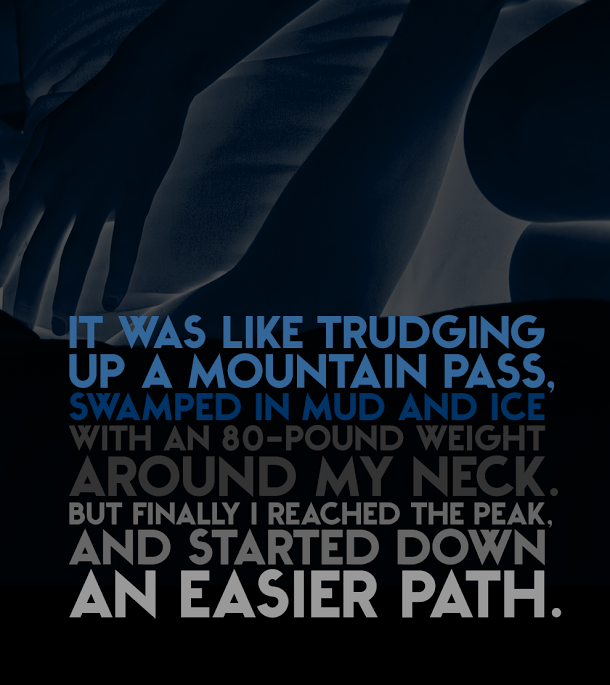
When I was 9, I was the victim of a vicious sexual assault by a friend's older brother. For years after that I was depressed. I kept it a secret, and was afraid to tell anyone for fear of being ostracized and treated differently. I felt alone, and since I had no one to talk to about it, I suffered in silence. When I was 15, I made a conscious decision to take my own life.
I knew that my dad kept a revolver in his nightstand. It was a Saturday in the spring, and my parents went to the local fair for the afternoon. I took my dad's revolver to our back patio and readied myself. As I was taking the gun out of its sheath, I heard a car pull into my parents' driveway. This spooked me, so I hid the gun, and found out it was my aunt coming to drop something off. After she left I put the gun back, went into the house, and cried. I saw it as a sign from God that I was not meant to die that day. I was still extremely bothered by what had happened to me as a child. A few years later, with the help of a friend, I was able to tell my parents about the assault. What helped me the most through my feelings and stages of utter despair was talking to other survivors who had been the victims of similar attacks.
There are many people who have been assaulted as children, I came to find out. I initially talked to a friend's sister who had been sexually abused as a child, as well. Over the years I have talked to many other people, and it was so uplifting to know that I was not alone. For me, the cure was talking to others. No matter how bad it may seem, or how alone you may feel, others are there to help. By the grace of God and good people, I was able to get through that trying time in my life.
—Anonymous
One of the saddest things in the world is to feel broken, and although you've somehow been figuratively ripped apart, you feel like can never be put back together again.
There are days when I ask myself, What are you staying here for? Most times I don't even have an answer. Sometimes I just don't want to be here anymore, and those are the toughest thoughts to deal with. But the days that I truly cherish are the ones where I'm so overwhelmed with happiness that it feels like I can beat this depression. That happiness comes from friends and the jokes we share with one another, it comes from family members and their unconditional love for me. I love when friends and family are able to penetrate the barrier of lies and insecurities that depression creates, allowing me to feel love. Those are the days that make life worth living, and those are the days that keep me fighting. The extremes of depression are the worst. One minute you could be on cloud nine and in the next you can feel like you've hit rock bottom.
I will be seeing a therapist soon. One day, however, I would like to get to a place where I can know for certain, without a doubt in my mind, that I belong here without the validation that comes from external forces.
—Michael Blackmon
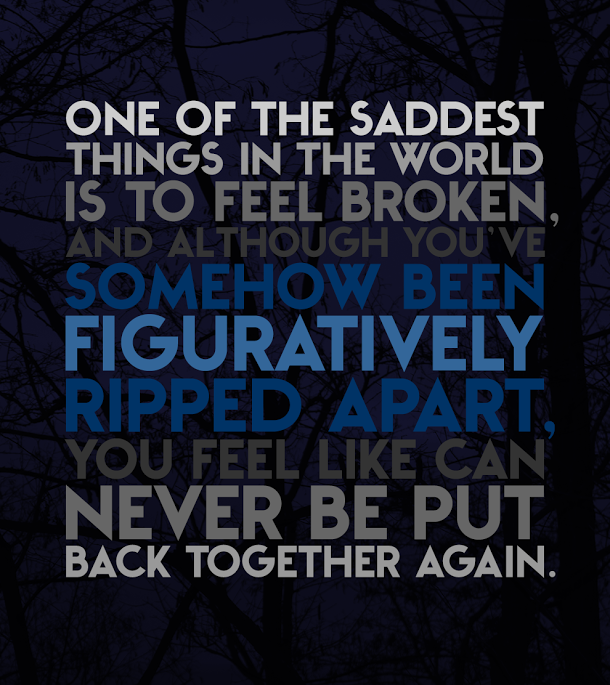
I've never been clinically diagnosed with depression, but depression is one of those things that you don't need someone to tell you you have it to feel its wrath. For me, it comes and goes in waves, depending on triggering moments. The toughest part about struggling with something so consuming and life-altering is knowing its effects firsthand, and in turn, knowing you're sometimes helpless and unable to make the pain other people feel any better.
After Robin Williams passed away last night, I was on Twitter looking at photos of the Good Will Hunting bench that some fans of his had turned into a memorial. One picture showed the bench and a quote from the film someone had written in chalk, "It's not your fault."
So often, people who suffer from depression and other mental illnesses are under the impression that their sicknesses are their burdens to carry, that it's somehow their problem and their problem alone. Not to mention that the stigmas our society has around anything that deviates from our standard expectations of mental health make depression even harder to talk about and grapple with. But if you suffer from depression, it's not your fault. It is not your fault. Thankfully, the people of Boston reminded me last night that Robin Williams knew it's not my fault, either.
—Krystie Yandoli
"Get some exercise, get those endorphins pumping, that always helps." "Join a club or something." "Just get out and get a little part-time job, something to just get you out of the house." These are all great suggestions for someone who may be looking to make a change in their life. But to someone struggling with clinical depression, they sound only like taunts. It took me a long time to come to terms with my depression. I started struggling with it in college but chalked it up to college blues and stress and overcommitment to various activities. I briefly went on meds, only to forget to refill my prescription because I "didn't have time," which only made it worse. But depression can hide for a while, and though the year after college was mostly fine, it came back later with a new vengeance. As I struggled to find a full-time job at a time when the industry and economy was crumbling and everyone was talking about the "death of journalism," I slipped deeper and deeper into depression, though I didn't know that's what it was at the time. I thought I wasn't working hard enough, maybe I was too lazy — if only I had more willpower. I felt embarrassed and ashamed at my shortcomings, unable to understand why someone who was known for being an overachiever could all of a sudden feel so useless and unable to function.
Therapy helped a bit. But it wasn't until I was able to understand that what I was struggling with was really dysthymia (chronic low-grade mild depression, which at times can dip into major depression) that I was really able to get help. While it was so easy for me to help others close to me who were struggling with depression get the help they needed, I was blind when it came to myself. In the fall of 2012 I spent more than three weeks unable to get out of my bed. Going out to get a coffee across the street felt like a triumph. And all the while I hid it from most everyone I knew.
When I first started feeling the effects of medication after finally seeing a psychiatrist, I couldn't believe that I'd waited that long to get help. It wasn't a magic pill that made everything better, but I was able to get out of bed in the morning. And you start to realize that it really shouldn't have been that hard to do the simple things. I didn't realize life could be another way until then. Life is hard enough on its own; it shouldn't be a daily struggle to leave your house, to cook a meal, to take a shower. After seeing the effects, I realized how long I'd tortured and blamed myself, thinking my sadness and futility was my fault somehow. But depression manifests in so many ways and across such a wide scale, I realized that I could've gone my whole life without realizing that there was a better way to live. And I hope that others reading this might know that even if your depression doesn't look like someone else's — maybe you're not bedridden, maybe you don't have major swings — there's still help out there for you, and it's not your fault. I know I'm one of the lucky ones, who responds well to medication and therapy. For many, it takes years to find the right combination of help to manage their depression. For many more, they're not able to find affordable access to mental health care. It's a problem I wish our country and health care industry would make a real priority.
—Aylin Zafar
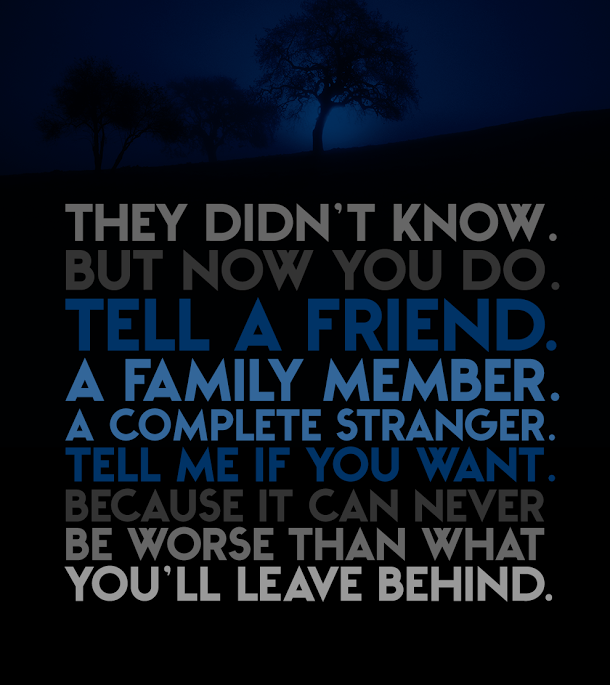
KT, Grandpa Ed, Josh. The names scroll through my head. Every day I think their names. KT, Grandpa Ed, Josh. It's not a voluntary thing. They, and others, burned their names into my brain during the most traumatic year and a half of my life.
Suicide is like that. It scars those it leaves behind. Open, festering wounds, yearning for some way to go back and undo the damage. But you can't. It's the most terrible kind of permanence that exists.
For many of us, myself included, thoughts of suicide are simply a part of life. This horrible, gaping hole that seemingly has no way of being filled. Like some kind of singularity, it draws us in. Inescapable.
And then one day, you feel true pain. The pain of your best friend choosing to leave you; of the punk-rock icon and father figure of a generation deciding to end it all; of the gentlest, most caring soul you've ever known succumbing to their own pain. KT, Grandpa Ed, Josh.
That pain is truly unbearable, because you know, no matter what, you must endure the pain of having lost people. No matter how weary, no matter how fucking tired you are, you can't put that on yet another person.
To do so would be to dismiss their pain. To diminish their pain. To reject the one thing that keeps those you have loved, and lost, alive: your memories.
So you soldier on. Every day, silently, unwillingly saying their names. And your one, your only respite, are the friends who walk that path with you.
KT, Grandpa Ed, Josh. Given the chance, each of them would undo their decision in a heartbeat. They would never leave us if they knew the price we pay. KT, Grandpa Ed, Josh.
They didn't know. But now you do. Tell a friend. A family member. A complete stranger. Tell me if you want. Because it can never be worse than what you'll leave behind.
I know, because of KT, Grandpa Ed, Josh, and all those who've gone home too soon of their own accord.
—John Stanton
There are times when my depression has made me feel like I'm not doing anything right in my life. That's a tough thought to fight against, because it feeds itself: Once you're convinced that you're worthless, you stop doing anything worthwhile. And suddenly you've become the person you already thought you were, someone who naps for hours just to make the days go by faster, and who looks for any excuse to avoid getting up or even turning on the light. But you're not worthless, even if your depression is keeping you from being an active member of society. When I got help and began to start feeling like a human again, I was able to reflect honestly on my achievements and the paths I have taken. And one of the things I'm proudest of, which is something I cling to when the depressive tendencies creep back, is that I've always been open about my struggles. I know how much it helps me to be reminded that I'm not alone. If I can do the same for others, I know I'm doing something right.
—Louis Peitzman
I went through maybe two full decades of my life in total denial of my depression. I think some people who were close to me could see it clearly, but I refused to identify as a person who was prone to depression. I didn't see myself as having problems as severe as other people, and didn't want others to think less of me. I never got help, even at the times when I actually did want it, because I didn't have a lot of money or insurance for long stretches of time. But that all caught up with me, and led to a period of clinical depression that got so bad that the only feelings strong enough to be felt through overwhelming numbness and apathy were anger, fear, and self-loathing. This had major consequences in my work life and led to me completely alienate someone with whom I was once very close. I had to reach this low to get real help beyond talk therapy, and to be prescribed an anti-depressant. It made all the difference, and I truly feel more like myself now. I am grateful that this positive change happened, but I think a lot about what my life would be like today if I had done this 10 years ago, 15 years ago, or 20 years ago. I urge other people, especially young people, to overcome their pride and do what they can to stop or at least manage destructive mental illness. It's a very hard thing to admit to having problems, but it's the only way you can hope to solve them.
—Anonymous
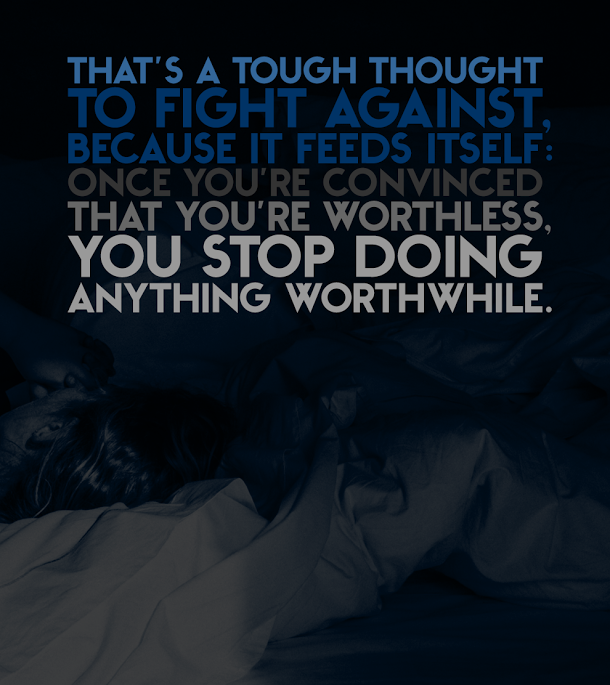
I never feel comfortable talking about depression because I've never been officially diagnosed, but I remember making threats to take my own life during my freshman year of high school. A few friends at the time confronted me about it, and for me, that was enough — to know someone cared. It'd be so easy to dismiss a 14-year-old's unfinished suicide plan as melodramatic, angsty, or "emo," and yeah, I guess I was all those things back then, but then again, no truly happy person is those things. I've seen articles on the internet about "real" depression vs. "fake" depression and I can't fathom how anyone could be so shallow as to think that those two things don't exist on the same plane — that someone who "fakes" depression (presumably for attention) doesn't really have a hard time living.
I don't have trouble getting out of bed, and I'm not outwardly moody (those are the stereotypes, right?). But happiness is a state of mind that requires great maintenance on my part — I actually don't know how to "just be happy." For me, it involves being constantly busy (distracted, even), regular exercise, a relatively healthy diet (I love cheese and ice cream too much), and a balance between bountiful social interaction and complete isolation. I'm not sure how many people feel like this. I have no idea. But happiness is work for many people. It's like skating on a flat surface — you make a few forceful pushes so you can glide, even if for a moment.
—Julia Pugachevsky
Robin Williams' death, as with some others before him, has hit me particularly hard because of the closeness with which I view his struggles. As someone who has faced addiction and mental health issues, I can only say that talking about it and seeking help has been so important for me. Sharing and finding help doesn't fix it all — and it doesn't always work — but almost everyone I know would say that it lessens the burden at times. And, so often for me, the lessening of that burden is all that I needed to convince me that the next morning might be better. And, that's a start.
—Chris Geidner
Some days depression feels like an invisible hand holding my head down. I know the voice of despair lies to me, and I know my worries are unfounded, but some days the lies are very hard to resist, and I feel these brief, soul-crushing moments of despair. And then when I pull through these moments, I feel stronger, but I still fear the next barrage of despair.
Once I started to wrestle with depression myself, my empathy increased dramatically. It is such a difficult thing to understand if you haven't experienced it. But I always encourage friends to seek therapy/counseling and most of all not to try to carry the burden by themselves. If you're struggling today, what you are going through is very real and if anyone gives you the impression you should simply "snap out of it" then you need to avoid that person's advice. It's not that simple. There is help and hope.
—Nathan Pyle
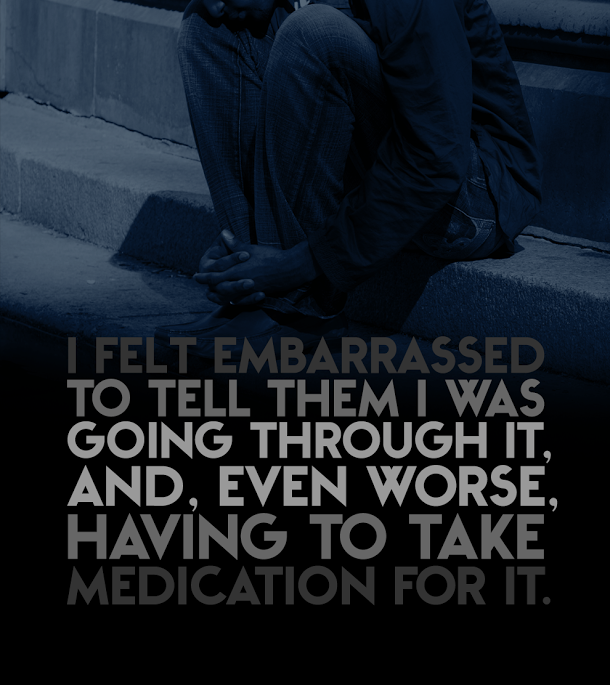
I was diagnosed with depression and bipolar disorder when I was 17, and I've been on and off medications and in and out of therapy ever since. I consider myself an incredibly happy, stable person. One fact doesn't contradict the other. The surprising thing I've learned, as an adult with depression, is that there isn't really such a thing — for me, at least — as a big turning point or lifesaving moment, and that that's OK. I've learned about the cycle, that sometimes I will feel those recognizable symptoms: the sense that I've hollowed out, retreated a bit too deeply into my mind, forgetful of the happiness I've known and worrisome that I won't feel it again. But I've also learned to trust the other swing of the cycle, even when it seems furthest away: that I will come back out, that I'm never too far gone, that I'll resist the fall into emptiness, and I'll turn off the episode of whatever show I'm binge-watching, and get dressed, and rejoin the world.
This isn't to say that I feel doomed to a life of depression; it's more a freedom to understand that if I do experience lows, it doesn't mean I (or my treatment) have somehow failed. I know that I'm susceptible to these lows but I also know, because I've been living it, that I can survive them. It's my trust in this fact that has been most important to me (along with, of course, the support of the people I love, therapy, and, when necessary, medication) because it reminds me of my will when it's at its weakest. It somehow makes those inevitable slumps less scary.
—Arianna Rebolini
I've been fighting depression and anxiety for years. And it is a fight. Every day I battle my own brain. Some days I feel like I am winning, but many days it feels like a fight I will inevitably lose. Especially when I see others lose their own battles. When someone takes their life, it's tragic for their own sake and for the sake of their families, but on a personal level it is terrifying. Because if someone like that — someone talented, successful, beloved, seemingly with everything to live for, someone who has battled in the past and apparently won — if someone like that loses their fight, then what hope do I have?
I try to remember that I do have hope. I hope that I can win this battle. I hope that I will have many more good days than bad days. I hope that everyone struggling knows they're not alone. I hope that in their darkest hours, people can fight their way through. I hope for understanding. I hope for compassion. I hope for happiness. I hope.
—Jenna Guillaume
I was diagnosed with depression when I was 11 years old and started taking medication when I was 13. "It's no different than taking medicine for your heart or for diabetes," my parents told me again and again, and I'm so grateful that they never made me feel ashamed of needing to take a pill to be my best self.
It was the rest of the world that made me feel like I could never be open about my mental health issues. And, to some degree, my own pride. Growing up, a large part of my identity was in my good grades and my intelligence, and I was afraid I would lose that if I ever admitted to needing help of any kind, let alone with facing the demons inside my head.
And so, when I began spiraling during my last semester of college, I didn't tell anyone. I locked myself in my dorm room, rarely leaving for class, my part-time job, or meals with friends. I had the perfect excuse: I was working on my honors thesis. Except that I wasn't. I was trying to. I was staring at my notes, staring at my flickering computer screen, and crying myself to sleep because I couldn't make myself write the words that were locked somewhere in my brain.
The on-campus therapist and psychiatrist changed my medications but didn't seem to take it seriously when I described my inability to go to class or write. "You're a smart girl. These will help and you'll be back on track soon," I remember the therapist telling me. But they didn't. And I wasn't. What's worse, I had to find out for myself about the school's program to help students experiencing mental health difficulties with their academics — and by the time I'd set up an appointment, it was too late to salvage my grades. My GPA dropped and graduating with honors was no longer in my future. I was able to graduate — barely — because (classic overachiever) I'd take extra classes every other semester. I never finished my thesis.
It's been three years since graduation and I haven't gone back to my college campus. I'm not sure when I will. An amazing university and an overall amazing experience remains overshadowed by the hell I endured for the last five months of my senior year.
I moved in with my parents and started seeing my old psychiatrist on a weekly basis until we figured out the right combination of medications to replace the ones that had stopped working after years of faithful service. In addition to my old friend depression, I was diagnosed with anxiety and given more meds. "I can't believe they couldn't see this," my doctor said, angrily. "You were clearly exhibiting all the signs. This new medication could have helped you so much." And, slowly, it did. I got an internship, and then the job that I had been aiming for since the summer after my sophomore year. I moved to Washington, D.C., and into a national newsroom. I landed my dream job at BuzzFeed and moved to New York City.
I've never told this story before, let alone written it down and, scariest of all, attached my name to it. Not even when a younger friend made the brave decision to withdraw from the same college in order to seek mental health treatment. I'm still a little afraid about my parents seeing this. But when I was living in the darkness inside my head, I never dreamed that I would escape, that I would still be able to live the life I'd worked for and wanted for myself. It is possible. Don't give up.
—Ellie Hall
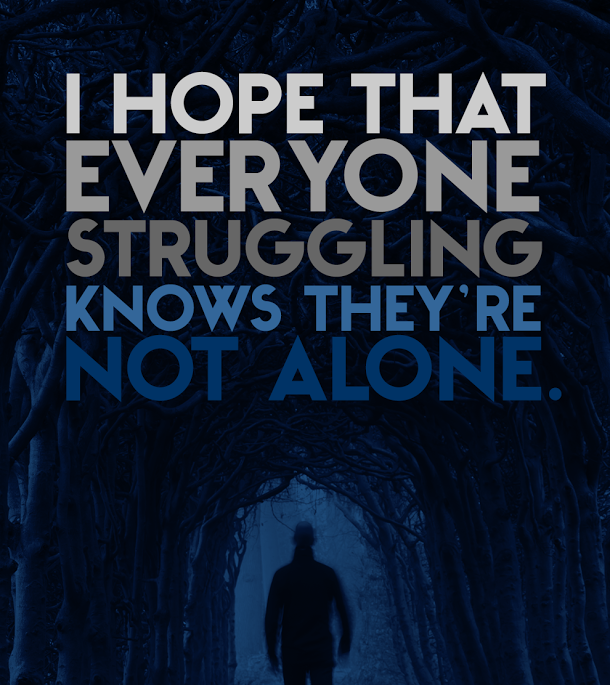
This month, I traveled to five new cities in three weeks. I tackled each day with enthusiasm and an expectation for great things. The energy was reciprocated; this is noteworthy because it was the first time in two years that I did not feel broken.
Moving to Los Angeles was supposed to be an exciting fresh start. I was in a city people dream of moving to, with a great job that others envied. And I cried every single day. Getting out of bed was a difficult task; I struggled to get dressed and make it out the door without breaking down. Often I couldn't make it through my workday without going to the bathroom to cry.
It was incredibly isolating; I knew my good Christian mother would just tell me I wasn't praying right and I needed a church home. I didn't want to call my friends because I was such a downer. I lost interest in everything. I had two moods: sad or numb, and I was disappointed in myself for having lost my ambition.
After a year and a half, I finally gathered the nerve to call my pastor back home. I was scared of what she would say, but I had to tell someone how tired I was of fighting — and losing to — sadness when I seemingly had "every reason to be happy." I told her I was considering therapy, and to my surprise, she agreed that it was a good idea. She said, "Please call me anytime, I mean it, even if you just need to cry into the phone. I will sit here and listen to you cry until you tell me to hang up."
And she meant it. Her not being judgmental gave me the courage I needed to seek help. Sometimes I felt crazy for having to pay someone to help me to not be sad. But peace of mind is so much more important than pride. I'm sure I'll get back to my ambitious plans to run the world someday soon, but for now I'm happy that my days of crying myself to sleep...awake...and asleep again are fewer than they've been in a while.
—Driadonna Roland
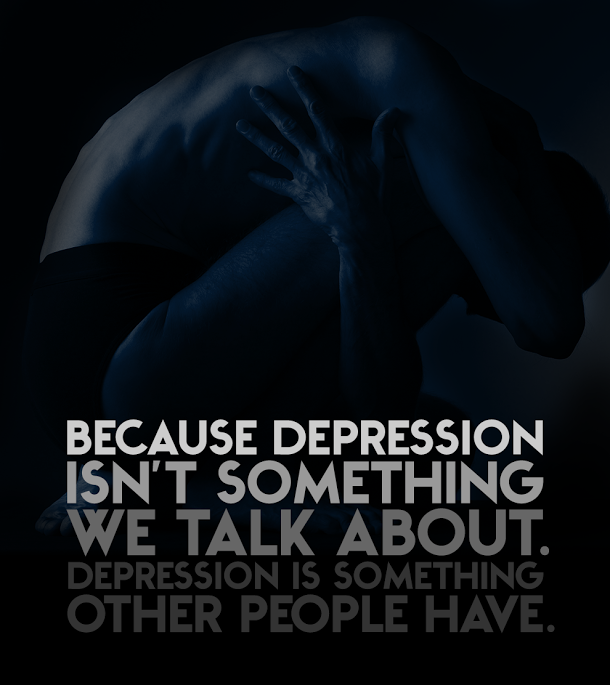
Depression comes in waves. Some days it feels as though you're in a drought and some days you're drowning, swallowing water until your thoughts are soaked and decaying from the salt. On these days not much can help you. You may have dozens of people waiting on the sand bar but when it hits it is only you treading and looking for air. On these days it is important to go easy on yourself, to allow yourself to feel your feelings, free of judgment. However, it is equally important to fight back. You must pay attention to your surroundings. You must find what makes the tides subside. You must understand that you don't have to do this alone — that like waves in the water, you can't control what hits you. But you can control how you prepare yourself for them. You can decide what safety devices you'll use against it. Find a lighthouse to keep in your mind's eye in the distance. Don't be afraid to ask for help and swim on.
—Mackenzie Kruvant
My depression went undiagnosed for a very long time. I say undiagnosed, but I mean unrecognised. I mean ignored. Because depression isn't something we talk about. Depression is something other people have. It's easy to tell yourself you're not naturally a bright, happy person. That you're just a bit moody, a bit grumpy. That you're just a little bit down today.
For a long time I tried to mask my depression, and most of the time I didn't mask it very well at all. Being afraid or unwilling to take responsibility for my mental health meant I wasn't really living. I was hiding.
I was 30 when my doctor told me the things I was describing are the trappings of clinical depression, and I realised then that I had been living with this since adolescence. Fifteen years is a long time to lie to yourself that everything is OK.
When ignored, depression is expensive. It has cost me friendships, opportunities, my health. It has cost me a marriage. For some people it costs them everything. But it doesn't have to.
I'm not ignoring it anymore. I'm not hiding. I talk to a therapist. I exercise. I walk to work to make sure I'm getting fresh air. I try to find the joy in things. I try to laugh, to cry, to feel. It's just a start, but I'm happier for it.
There isn't a cure for depression, but there are ways of coping. Silence is never one of those ways.
—Daniel Dalton
Here are a few resources to use whenever you need to reach out to someone:
This website allows you to speak with someone immediately if you're dealing with thoughts of suicide.
If you want to speak with someone anonymously, go here for additional help.
And there is the National Suicide Prevention Lifeline, which you can reach here: 1-800-273-8255.
Note: The headline was changed to more accurately reflect the content and tone of the post.

